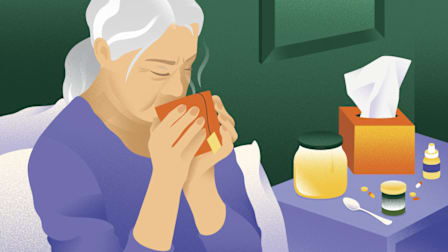U.S. Health Officials Recommend COVID-19 Booster Shots for All Americans
The boosters, in part a response to the Delta variant, should be given eight months after a second dose. They could be available starting Sept. 20.

All Americans who have been vaccinated with the Moderna or Pfizer-BioNTech COVID-19 vaccine should get a third booster shot eight months after their second dose, U.S. health officials announced on Wednesday.
Booster doses could become available starting the week of Sept. 20. But before that plan is implemented, the Food and Drug Administration and the Centers for Disease Control and Prevention’s Advisory Committee on Immunization Practices must independently review the data and concur that a third dose is safe, effective, and recommended.
“The available data make very clear that protection against SARS-CoV-2 infection begins to decrease over time following the initial doses of vaccination, and in association with the dominance of the Delta variant, we are starting to see evidence of reduced protection against mild and moderate disease,” health officials said in a statement signed by CDC Director Rochelle Walensky, Acting FDA Commissioner Janet Woodcock, Surgeon General Vivek Murthy, National Institutes of Health Director Francis Collins, and others.
“Based on our latest assessment, the current protection against severe disease, hospitalization, and death could diminish in the months ahead, especially among those who are at higher risk or were vaccinated during the earlier phases of the vaccination rollout,” the officials said. “For that reason, we conclude that a booster shot will be needed to maximize vaccine-induced protection and prolong its durability.”
The new recommendation comes shortly after the FDA authorized a third dose for immunocompromised people. It does not yet apply to the small percentage of Americans who received the Johnson & Johnson single-dose vaccine. Officials said that people who received that vaccine are expected to need boosters as well, but they are waiting for additional data. A booster recommendation for Johnson & Johnson recipients is expected in the next few weeks.
“We do not believe the general population needs booster shots today,” Murthy said at a White House news conference Wednesday. “We are announcing a plan for the future.”
Boosters Against the Delta Variant
The booster shot plan is designed to combat the Delta variant of the coronavirus that causes COVID-19. That variant, which is now dominant in the U.S., is far more infectious than the original strain of the virus, and has caused a dramatic surge in new cases.
Early Evidence on Boosters
On Monday, Pfizer announced results from a small, early-stage clinical trial, showing that a third dose appeared to be safe and provided a strong boost in protective antibodies that should help fight off infections.
Early data indicate that a third dose could boost protective antibodies tenfold, Anthony Fauci, MD, director of the National Institute of Allergy and Infectious Diseases, said at the news conference. This increased protection may be required to protect against Delta, he said.
Protecting the World
With so much of the rest of the world completely unvaccinated, plans to provide boosters have been criticized by the World Health Organization. Earlier this month, the WHO called for a moratorium on boosters until at least the end of September, with the goal of vaccinating at least 10 percent of the population of all countries before wealthy countries start handing out additional doses.
As of Aug. 11, almost 54 percent of the population of high-income countries had received at least one vaccine dose, while 1.63 percent of the population of low-income countries had received at least that first dose.
Some health experts argue that using more doses as boosters for people who are already vaccinated may ultimately make everyone less safe. “Choosing an unknown but potentially incremental benefit for a person in a wealthy country over a massive, lifesaving one for a person elsewhere in the world is a losing strategy, because new variants will inevitably arise in places where the spread of COVID-19 continues unabated,” according to an editorial published in Nature.
“If we think the job of the vaccines should be to protect against severe illness [and] the development of more dangerous mutations, then we would boost only most at-risk people,” Andy Slavitt, a former adviser to the White House on COVID-19, said on Twitter—primarily the immunocompromised, not everyone. “If we want the vaccine to protect us against symptoms and transmissions (in the first world), then we do so at the cost of others around the globe [and] the cost of future variants.”




